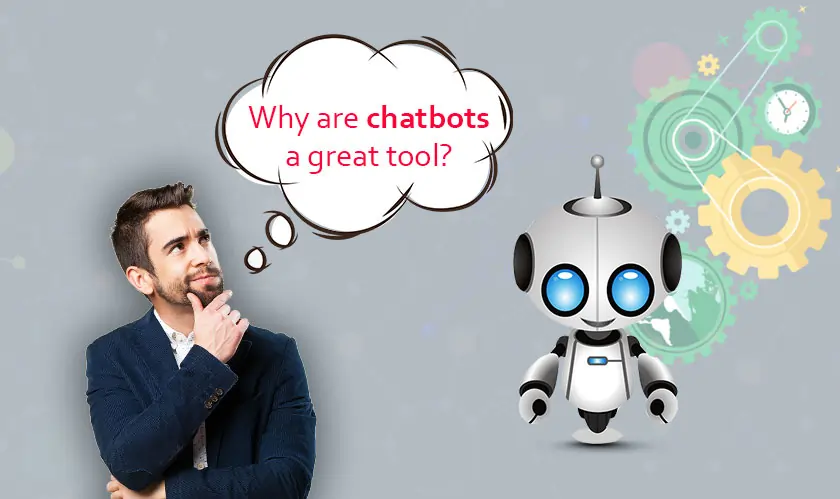Home Technology Artificial intelligence Why Chatbots Are a Game-Change...
Artificial Intelligence

CIO Bulletin
10 September, 2024
In the digitalization world, organizations are enhancing their marketing strategies and streamlining operations through innovative technologies. The AI-powered chatbots stand out as a powerful tool among these technologies for marketing automation. These intelligent systems are everywhere; they are transforming how companies engage with clients, qualify leads, and improve marketing strategies. In this article, we will explore how chatbots are shaping the marketing industries, emphasizing their impact on client nurturing, lead nurturing, and sales funnel automation.
The use of AI in the marketing industry has created new opportunities for businesses to interact with their clients. AI chatbots are transforming and providing a smooth blend of automation and personalization. By including chatbots into their marketing strategies, companies can achieve various benefits that significantly improve their overall performance.
One of the main reasons to include chatbots in marketing strategy is their ability to improve audience engagement. Unlike the old-methods that often depend on passive communication, chatbots offer a active and interactive way to connect with users. They can initiate conversation, answer queries, and provide individualized recommendations based on user behavior.
For example, a chatbot integration on an online website can greet the visitors and offer assistance accordingly. This kind of proactive approach not only engages users but also helps in retaining their interest, leading to higher chances of conversion.
Lead nurturing is an essential component of the sales process. AI-powered chatbots excel in this area by automating the qualification leads. The chatbots can ask clear and targeted questions to assess the potential of each lead instead of relying on manual or lengthy processes. These data-driven approaches ensure that only the essential leads are passed on to the sales teams.
By utilizing AI customer interaction, the chatbots can analyze the responses and determine the level of interest and readiness to purchase. This not only ensures that leads receive timely follow-ups but also saves time, improving the overall efficiency of the sales funnel.
The sales funnel is a complicated journey that includes multiple stages, from initial contact to final purchase. Chatbots play an important role by guiding the users through the process in sales funnel automation. They can provide information about various products and services provided by the company, assist with the checkout process, and also handle post-purchase queries.
By automating these elements, chatbots help in reducing manual effort and ensuring a smooth experience for customers. This updated approach not only improves and enhances the sales process but boosts customer satisfaction, leading to higher retention rates.
One of the most significant benefits of integrating AI chatbots in marketing strategy is the potential for cost reduction. Old methods of customer service often require basic human resources and operational costs. Chatbots, on the other hand, offer a cost-effective solution by handling routine inquiries and tasks.
By automating repetitive tasks, chatbots free up valuable time for the tam to focus on other strategic activities. This not only reduces costs but also improves overall efficiency, allowing businesses to allocate resources more effectively.
Personalized marketing is another key driver of customer satisfaction and loyalty. With chatbots, businesses can deliver personalized experiences at scale. The chatbots can tailor interactions and recommendations to individual needs by analyzing user data. This level of personalization improves the user experience and increases conversion rates.
For instance, if a user shows interest in a particular product, the chatbot can provide relevant information, suggest freebies, or offer discounts. This personalized approach makes sure that users feel valued and understood, promoting a stronger connection with the specific brand.
As the world is changing rapidly, customers expect 24/7 support and availability. AI chatbots provide support around the clock, ensuring the users have access to assistance at any time of the day. This constant availability helps in addressing queries, reducing the chances of customer waiting or frustration.
Whether it’s answering frequently asked questions, resolving issues, or providing product information, chatbots can handle a wide range of customer interactions without the need for human involvement. This not only improves the experience but also ensures that business remains accessible and responsive.
Data-driven marketing is essential for making informed decisions and optimizing your strategies. Chatbots contribute significantly to this by collecting and analyzing data from interactions with users. This data provides valuable insights into customer behavior, preferences, and pain points.
By leveraging these insights, businesses can refine their marketing strategies, improve targeting, and enhance the effectiveness of their campaigns. For instance, if chatbots identify a common issue among users, you can address it proactively through your marketing efforts, resulting in a more tailored and effective approach.
Successfully integrating chatbots into your marketing strategy requires careful planning and execution. Here are some key steps to ensure a seamless integration:
Conclusion
Chatbots with AI capabilities are more than simply new technology; they are a strategic tool that can change the way companies handle marketing automation. By enhancing client engagement, automating lead nurturing, and streamlining sales funnel automation, chatbots provide a number of advantages that increase productivity and enhance liking.
In the highly competitive market of today, their capacity to offer round-the-clock customer service, create experiences, and produce insightful data makes them an invaluable asset. To stay ahead of the curve and achieve long-term success, businesses will need to use chatbots for business automation and AI consumer connection as they keep on accepting digital transformation.
FAQ’s
1. How do AI-powered chatbots enhance customer engagement?
AI-powered chatbots enhance customer engagement by offering real-time, interactive communication. They can initiate conversations, respond to queries, and provide personalized recommendations based on user behavior, making interactions more engaging and relevant.
2. What role do chatbots play in lead qualification?
Chatbots automate lead qualification by asking targeted questions to assess each lead's potential. This data-driven approach ensures that only the most promising leads are forwarded to the sales team, improving efficiency and effectiveness in the sales process.
3. How can chatbots streamline the sales funnel?
Chatbots streamline the sales funnel by guiding users through various stages, from initial contact to final purchase. They provide product information, assist with checkout, and handle post-purchase queries, ensuring a smooth and efficient sales process.
4. What are the cost benefits of using chatbots for customer service?
Chatbots reduce costs by automating routine inquiries and tasks that would otherwise require human resources. This not only lowers operational expenses but also frees up staff to focus on more strategic activities, enhancing overall efficiency.
5. How do chatbots contribute to data-driven marketing?
Chatbots collect and analyze data from user interactions, providing valuable insights into customer behavior and preferences. Businesses can leverage this data to refine their marketing strategies, improve targeting, and enhance campaign effectiveness.

Insurance and capital markets







